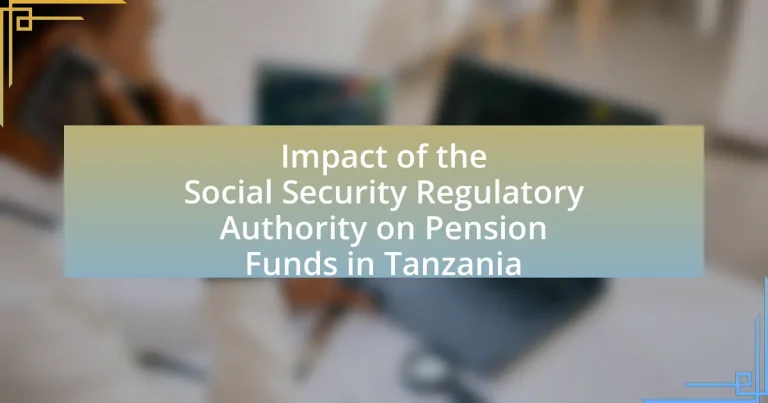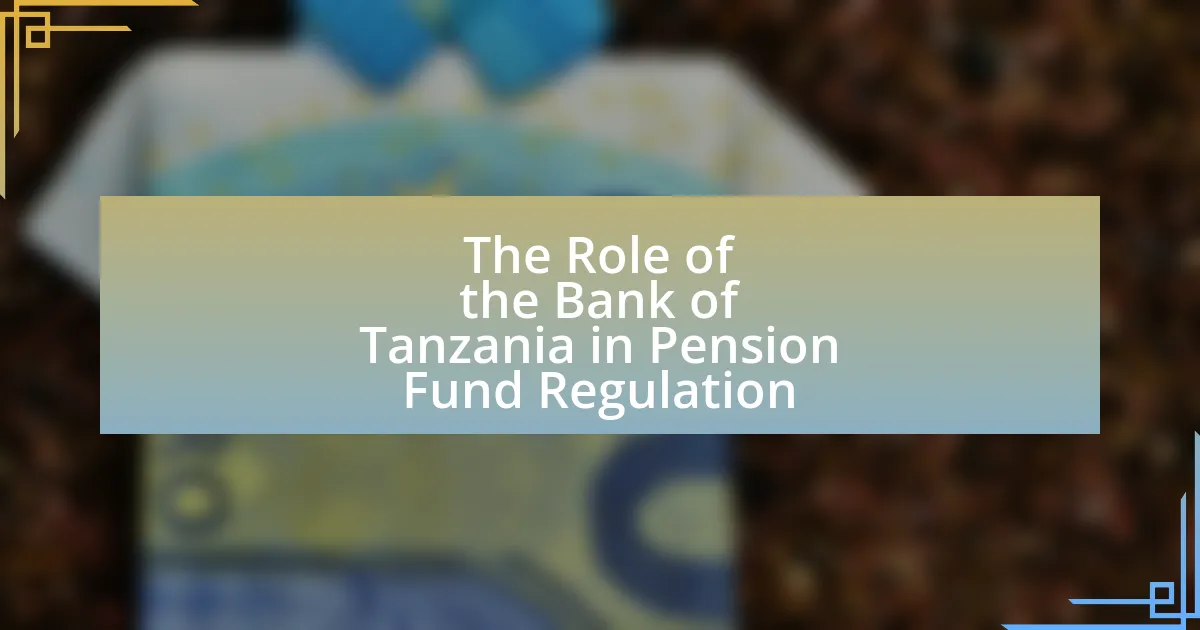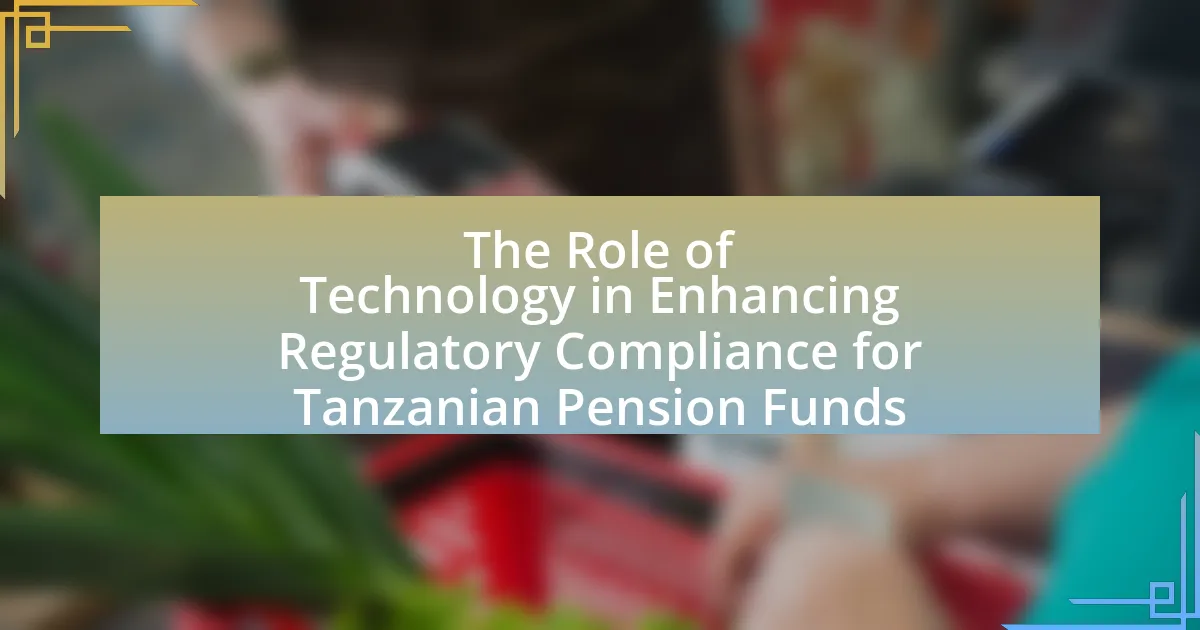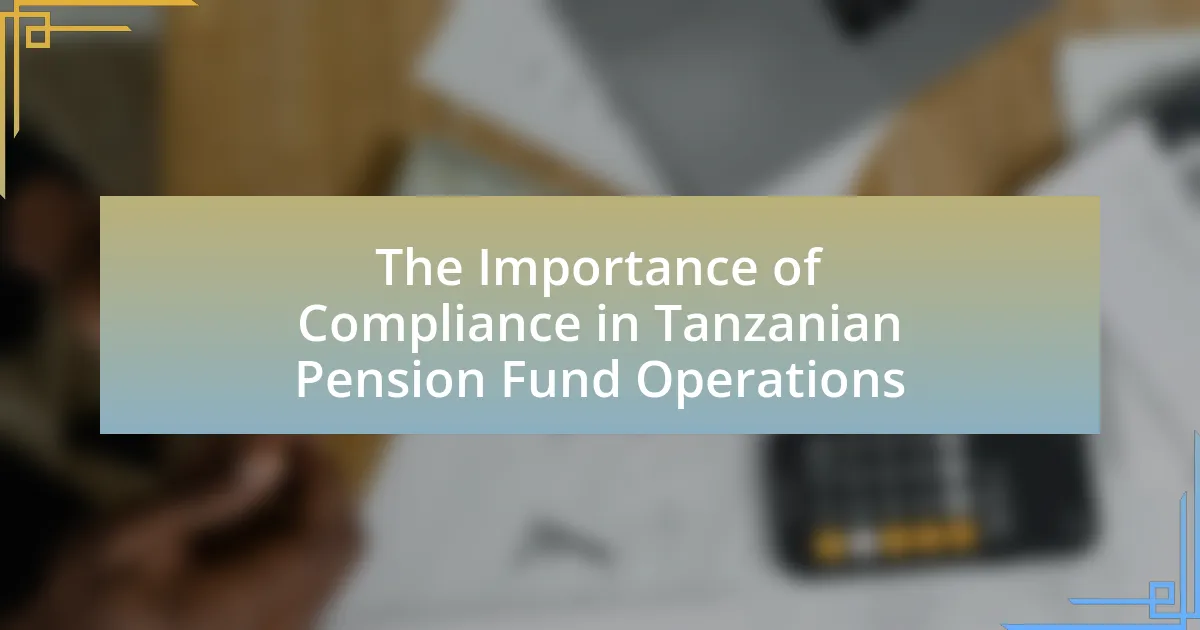The Social Security Regulatory Authority (SSRA) is a key government agency in Tanzania tasked with overseeing and regulating social security schemes, particularly pension funds. The article examines the SSRA’s role in ensuring compliance with social security laws, promoting the sustainability of pension funds, and protecting the interests of contributors and beneficiaries. It highlights the authority’s influence on pension fund management through regulatory frameworks, compliance enforcement, and the establishment of best practices. Additionally, the article addresses the challenges faced by the SSRA, the importance of public awareness, and the impact of regulatory oversight on the financial stability and performance of pension funds in Tanzania.

What is the Social Security Regulatory Authority and its role in Tanzania?
The Social Security Regulatory Authority (SSRA) is a government agency in Tanzania responsible for overseeing and regulating social security schemes in the country. Its primary role includes ensuring compliance with social security laws, promoting the sustainability of pension funds, and protecting the interests of contributors and beneficiaries. The SSRA also monitors the financial health of pension funds, ensuring they meet regulatory standards and operate efficiently, which is crucial for the long-term viability of social security systems in Tanzania.
How does the Social Security Regulatory Authority influence pension funds?
The Social Security Regulatory Authority (SSRA) influences pension funds in Tanzania by establishing regulatory frameworks that govern their operations and ensuring compliance with national laws. The SSRA sets standards for fund management, investment strategies, and financial reporting, which helps protect the interests of pension fund members. For instance, the SSRA mandates that pension funds maintain a minimum level of liquidity and diversify their investment portfolios to mitigate risks. This regulatory oversight is crucial for maintaining the stability and sustainability of pension funds, ultimately safeguarding the retirement savings of Tanzanian workers.
What are the key functions of the Social Security Regulatory Authority?
The key functions of the Social Security Regulatory Authority include overseeing the management of social security schemes, ensuring compliance with relevant laws and regulations, and protecting the interests of members and beneficiaries. The authority regulates pension funds to ensure their sustainability and proper governance, which is crucial for the financial security of retirees. Additionally, it monitors the financial health of social security institutions to prevent insolvency and promote effective service delivery. These functions are essential for maintaining public trust and ensuring that pension funds operate efficiently in Tanzania.
How does the authority ensure compliance among pension funds?
The authority ensures compliance among pension funds through a combination of regulatory oversight, regular audits, and enforcement of legal frameworks. The Social Security Regulatory Authority in Tanzania monitors pension funds by requiring them to submit periodic reports and financial statements, which are then reviewed for adherence to established guidelines. Additionally, the authority conducts on-site inspections and audits to assess the operational practices of pension funds, ensuring they align with the Pension Act and other relevant regulations. Non-compliance can result in penalties or corrective actions, reinforcing the importance of adherence to the regulatory standards set forth by the authority.
Why is the Social Security Regulatory Authority important for pension fund management?
The Social Security Regulatory Authority is crucial for pension fund management as it establishes and enforces regulations that ensure the financial stability and integrity of pension funds. By overseeing compliance with laws and standards, the Authority protects the interests of contributors and beneficiaries, thereby fostering trust in the pension system. For instance, the Authority mandates regular audits and reporting requirements, which help to mitigate risks and enhance transparency in fund operations. This regulatory framework is essential for maintaining the sustainability of pension funds, ultimately contributing to the economic security of retirees in Tanzania.
What challenges do pension funds face without regulatory oversight?
Pension funds face significant challenges without regulatory oversight, including increased risk of mismanagement and fraud. The absence of regulations can lead to a lack of transparency in investment practices, making it difficult for stakeholders to assess the financial health of the funds. Additionally, without oversight, pension funds may engage in high-risk investments that jeopardize beneficiaries’ savings, as evidenced by cases in various countries where unregulated funds have faced insolvency due to poor investment decisions. Furthermore, the lack of regulatory frameworks can result in inadequate protection for members, leaving them vulnerable to losses and diminishing trust in the pension system.
How does regulation enhance the sustainability of pension funds?
Regulation enhances the sustainability of pension funds by establishing standards that ensure financial stability and protect beneficiaries’ interests. These regulations require pension funds to maintain adequate funding levels, diversify investments, and adhere to risk management practices, which collectively mitigate the risk of insolvency. For instance, the Social Security Regulatory Authority in Tanzania mandates that pension funds conduct regular actuarial valuations to assess their financial health, ensuring they can meet future obligations. This regulatory framework not only promotes transparency but also fosters confidence among contributors, ultimately leading to a more sustainable pension system.
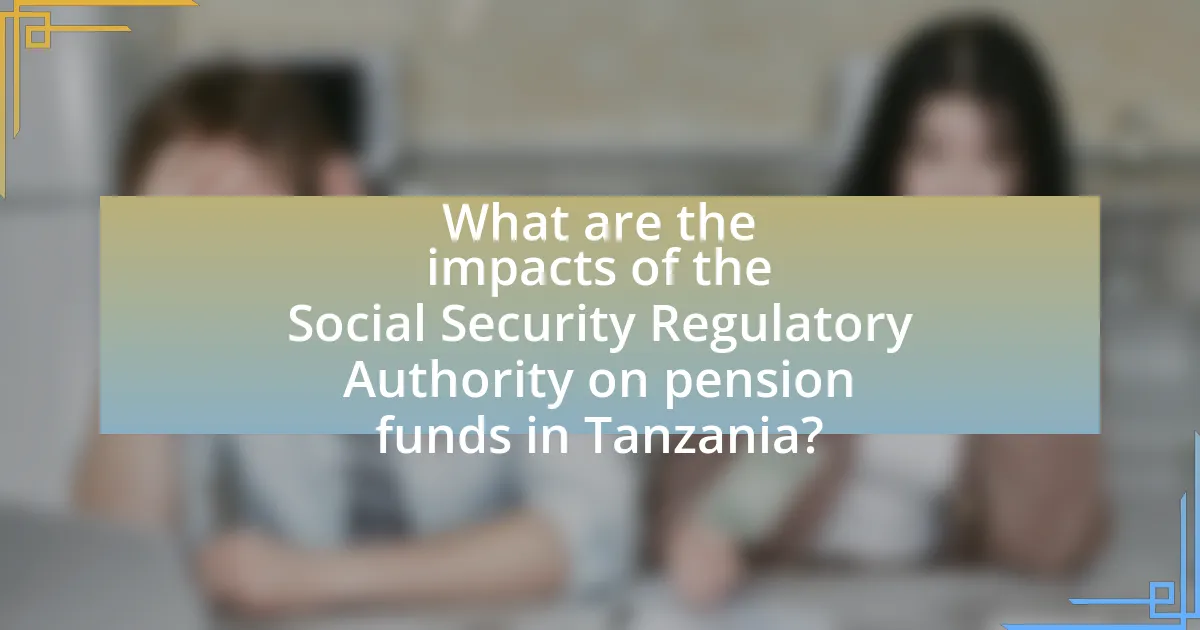
What are the impacts of the Social Security Regulatory Authority on pension funds in Tanzania?
The Social Security Regulatory Authority (SSRA) significantly impacts pension funds in Tanzania by enhancing regulatory oversight and promoting financial stability. The SSRA establishes guidelines that ensure pension funds operate within a framework that protects members’ contributions and benefits, thereby fostering trust in the system. For instance, the SSRA mandates regular audits and compliance checks, which help mitigate risks associated with mismanagement and fraud. Additionally, the authority’s role in setting investment limits and diversification requirements aids in safeguarding the assets of pension funds, contributing to their long-term sustainability and growth.
How has the authority changed the landscape of pension funds?
The Social Security Regulatory Authority has significantly transformed the landscape of pension funds in Tanzania by implementing stricter regulations and enhancing governance standards. These changes have led to improved transparency and accountability within pension fund management, ensuring that funds are managed more effectively and in the best interest of beneficiaries. For instance, the introduction of mandatory reporting requirements has increased oversight, allowing for better monitoring of fund performance and risk management. Additionally, the authority’s efforts to promote financial literacy among members have empowered individuals to make informed decisions regarding their retirement savings, ultimately fostering a more sustainable pension system.
What specific policies have been implemented by the authority?
The Social Security Regulatory Authority in Tanzania has implemented several specific policies aimed at enhancing the management and sustainability of pension funds. These policies include the establishment of minimum capital requirements for pension funds, which ensures that funds maintain adequate reserves to meet future obligations. Additionally, the authority has introduced regulations on investment diversification, mandating that pension funds allocate their assets across various sectors to mitigate risks. Furthermore, the authority has enforced transparency and reporting standards, requiring pension funds to regularly disclose financial information to stakeholders, thereby promoting accountability. These measures are designed to strengthen the overall stability and reliability of the pension system in Tanzania.
How do these policies affect pension fund performance?
Policies set by the Social Security Regulatory Authority in Tanzania significantly influence pension fund performance by establishing regulatory frameworks that dictate investment strategies, risk management, and fund governance. These regulations can enhance fund performance by ensuring that pension funds adhere to prudent investment practices, which can lead to better risk-adjusted returns. For instance, the introduction of minimum capital requirements and investment diversification mandates can mitigate risks associated with market volatility, thereby stabilizing fund performance. Additionally, compliance with these policies can improve investor confidence, attracting more contributions and ultimately enhancing the fund’s financial health.
What are the benefits of regulatory oversight for pension fund members?
Regulatory oversight for pension fund members ensures the protection of their investments and promotes financial stability. This oversight establishes standards for fund management, requiring transparency and accountability from pension fund administrators. For instance, in Tanzania, the Social Security Regulatory Authority mandates regular audits and reporting, which helps to safeguard members’ contributions and ensures that funds are managed prudently. Additionally, regulatory frameworks often include mechanisms for dispute resolution, providing members with recourse in case of mismanagement or fraud. This structured approach enhances trust in the pension system, ultimately benefiting members by securing their retirement savings.
How does regulation protect the interests of pension fund contributors?
Regulation protects the interests of pension fund contributors by establishing legal frameworks that ensure transparency, accountability, and the prudent management of pension assets. In Tanzania, the Social Security Regulatory Authority enforces guidelines that require pension funds to disclose financial information, thereby allowing contributors to assess the performance and risks associated with their investments. Additionally, regulations mandate minimum funding levels and investment diversification, which mitigate the risk of fund insolvency and protect contributors’ savings. These measures are supported by the Pension Act of 2008, which aims to safeguard contributors’ rights and enhance the overall stability of the pension system.
What improvements in pension fund management can be attributed to the authority?
The Social Security Regulatory Authority has implemented several improvements in pension fund management in Tanzania, including enhanced regulatory frameworks, increased transparency, and better risk management practices. These improvements have led to more efficient fund operations and increased member confidence. For instance, the introduction of stricter investment guidelines has resulted in a more diversified investment portfolio, reducing risks associated with market volatility. Additionally, the authority’s emphasis on regular audits and reporting has improved accountability among pension fund managers, ensuring that funds are managed in the best interest of beneficiaries.

What challenges does the Social Security Regulatory Authority face in regulating pension funds?
The Social Security Regulatory Authority faces several challenges in regulating pension funds, including inadequate regulatory frameworks, limited resources for oversight, and compliance issues among pension fund managers. The existing regulatory frameworks may not fully address the complexities of modern pension schemes, leading to gaps in governance. Additionally, the authority often operates with limited financial and human resources, which hampers its ability to effectively monitor and enforce regulations. Compliance issues arise when pension fund managers fail to adhere to established guidelines, resulting in potential risks to beneficiaries’ savings. These challenges are compounded by the need for continuous adaptation to evolving economic conditions and demographic changes in Tanzania.
How does the authority address issues of compliance and enforcement?
The Social Security Regulatory Authority in Tanzania addresses issues of compliance and enforcement through a structured regulatory framework that includes regular audits, monitoring, and the imposition of penalties for non-compliance. The authority conducts periodic inspections of pension funds to ensure adherence to established regulations, which helps maintain the integrity of the pension system. Additionally, the authority has the power to impose fines and sanctions on entities that fail to comply with the legal requirements, thereby reinforcing accountability. This approach is supported by the Social Security Act, which outlines the responsibilities and powers of the authority in enforcing compliance among pension funds.
What are the common compliance issues faced by pension funds?
Pension funds commonly face compliance issues such as inadequate reporting, failure to meet regulatory requirements, and improper fund management practices. Inadequate reporting can lead to discrepancies in financial statements, which may result in penalties from regulatory bodies. Failure to meet regulatory requirements often stems from a lack of understanding of the evolving legal landscape, which can expose funds to legal risks. Improper fund management practices, including conflicts of interest and misallocation of assets, can also violate compliance standards set by authorities. These issues are critical as they can undermine the financial stability of pension funds and erode trust among beneficiaries.
How effective are the enforcement mechanisms in place?
The enforcement mechanisms in place for the Social Security Regulatory Authority (SSRA) in Tanzania are moderately effective. The SSRA has established regulatory frameworks and compliance requirements that pension funds must adhere to, which include regular audits and reporting obligations. However, challenges such as limited resources for enforcement and varying levels of compliance among pension funds hinder overall effectiveness. For instance, a report by the International Labour Organization in 2021 highlighted that while the SSRA has made strides in regulatory oversight, the actual enforcement of compliance measures remains inconsistent, affecting the stability and reliability of pension funds in the country.
What role does public awareness play in the effectiveness of the authority?
Public awareness significantly enhances the effectiveness of the Social Security Regulatory Authority in Tanzania by fostering informed participation and compliance among stakeholders. When the public is aware of their rights and the benefits of pension funds, they are more likely to engage with the authority, leading to increased transparency and accountability. For instance, studies indicate that higher levels of public awareness correlate with improved regulatory outcomes, as informed citizens can advocate for better services and hold authorities accountable. This dynamic creates a feedback loop that strengthens the authority’s capacity to implement effective policies and regulations in the pension sector.
How can increased awareness improve pension fund participation?
Increased awareness can significantly improve pension fund participation by educating individuals about the benefits and importance of saving for retirement. When people understand how pension funds work, including their potential for long-term financial security and the advantages of compound interest, they are more likely to enroll and contribute. Research indicates that countries with robust financial literacy programs see higher participation rates in pension schemes; for instance, a study by the World Bank found that financial education initiatives can increase pension enrollment by up to 30%. This correlation highlights that informed individuals are more inclined to take proactive steps towards securing their financial future through pension funds.
What strategies can the authority employ to enhance public understanding?
The authority can enhance public understanding by implementing comprehensive educational campaigns that focus on the benefits and functions of pension funds. These campaigns can include workshops, seminars, and informational materials distributed through various media channels, ensuring accessibility to diverse demographics. For instance, the Social Security Regulatory Authority in Tanzania can utilize community outreach programs to directly engage with citizens, providing clear explanations of pension fund operations and their importance for financial security. Evidence from similar initiatives in other countries shows that targeted educational efforts significantly improve public awareness and participation in pension schemes, leading to better financial planning and increased trust in the system.
What best practices can pension funds adopt to align with regulatory standards?
Pension funds can adopt best practices such as implementing robust governance frameworks, ensuring transparency in reporting, and conducting regular compliance audits to align with regulatory standards. These practices help pension funds maintain accountability and adhere to the guidelines set by the Social Security Regulatory Authority in Tanzania. For instance, establishing a clear governance structure with defined roles and responsibilities enhances decision-making processes and compliance with regulations. Additionally, transparent reporting of financial performance and investment strategies fosters trust and meets regulatory requirements. Regular compliance audits identify potential gaps in adherence to regulations, allowing pension funds to proactively address issues and align with the standards set forth by the authority.
